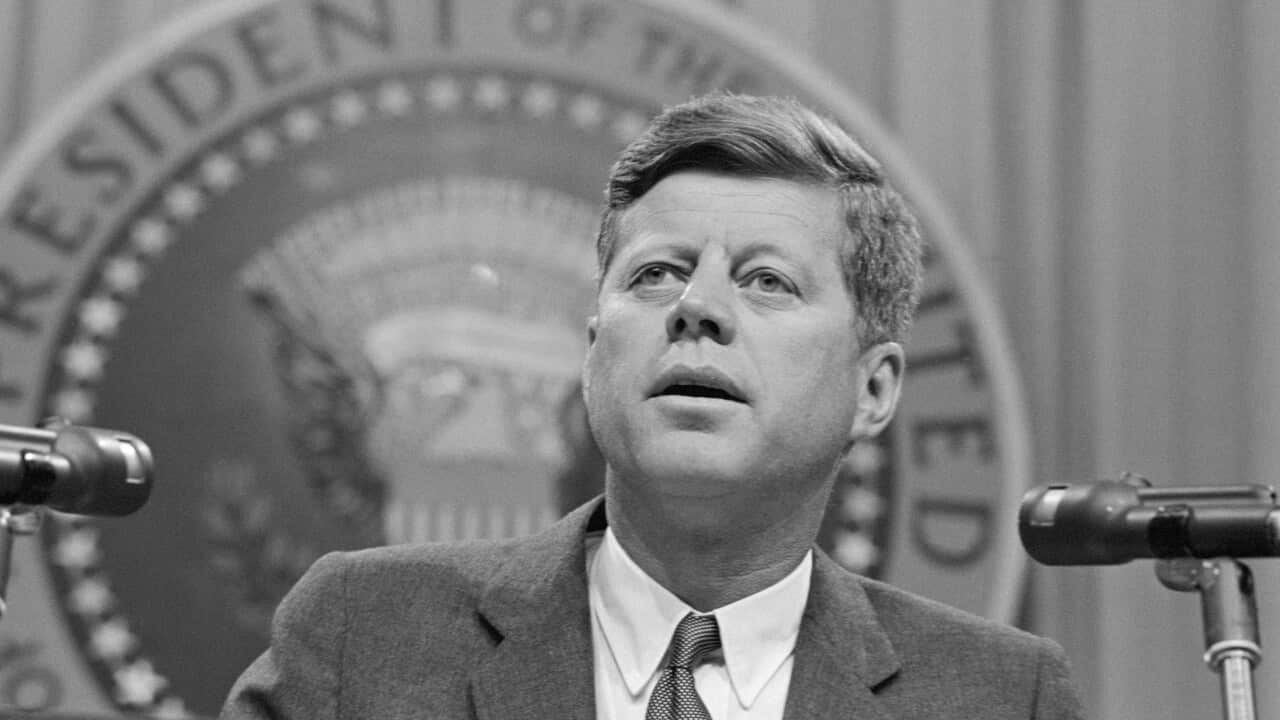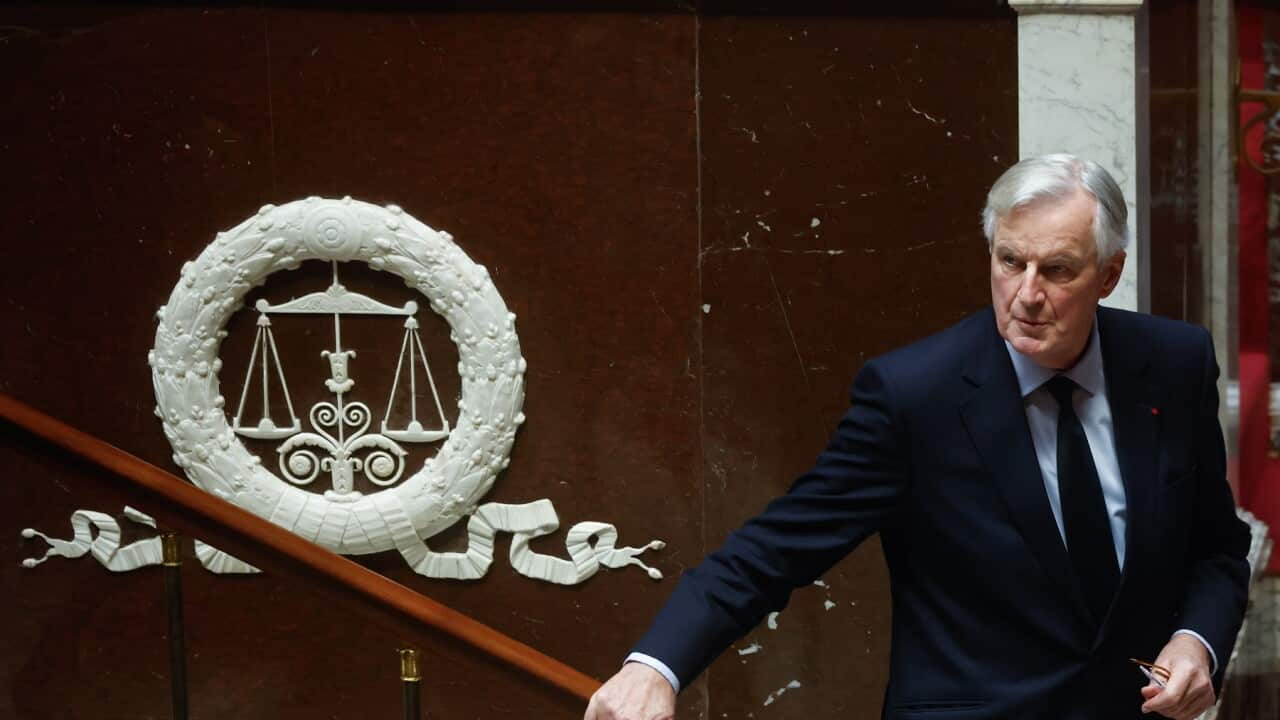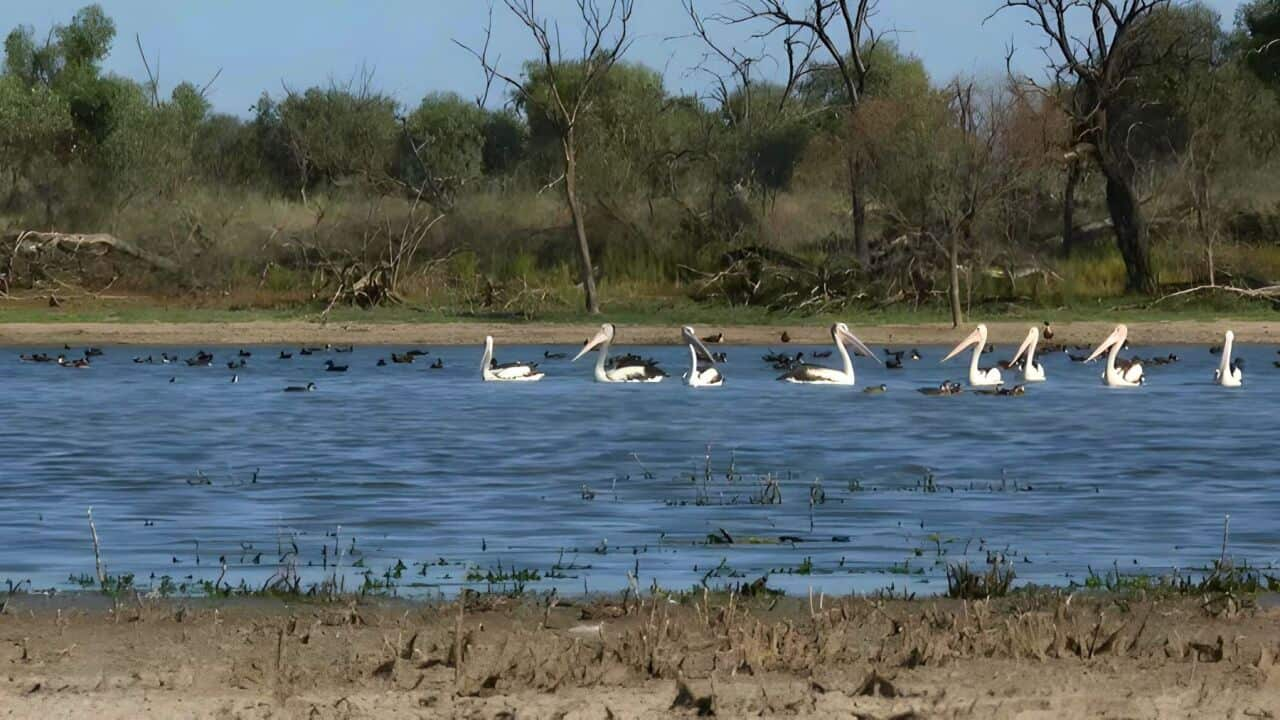TRANSCRIPT
[Sound effects – Memorial]
It's been 60 years since a titan of United States politics - John Fitzgerald Kennedy - was assassinated in Dallas, Texas aged 46.
These are the sounds of a memorial held in the former president's honour earlier this month with U-S Army officers and relatives of Mr Kennedy paying their respects and laying a wreath at his grave site in Arlington National Cemetery in the eastern state of Virginia.
But how has the Cold War leader's legacy stood the test of time and what are the lasting impacts of his shocking and gruesome death?
Bruce Wolpe is a senior fellow at the United States Studies Centre at the University of Sydney.
He says the young politician's style was infectious to many.
"He was the new generation breakthrough leader after World War Two and he really wanted to get America moving again. And people got caught up in his sense of style. And given his youth and especially his vigour, and his energy, his style, his charisma, he was the first television President really."
Mr Kennedy, otherwise known as JFK, was born May 29, 1917, in Brookline, Massachusetts.
He served as a Navy lieutenant in the Pacific in World War Two, and rode a wave of praise for his wartime heroics to become a congressman for Massachusetts in 1947.
He was later elected to the U-S Senate in 1953, the same year he married his wife and future first-lady Jacqueline Lee Bouvier.
Despite JFK's Catholicism being quite controversial in a historically protestant nation, he was able to beat out Richard Nixon in the 1960 election to become the youngest and first-ever Catholic U-S president.
JFK: "I John Fitzgerald Kennedy do solemnly swear.
Chief Justice Earl Warren: "That you will faithfully execute the office of President of the United States."
JFK: "That I will faithfully execute the office of President of the United States."
"The torch has been passed to a new generation of Americans born in this century. Tempered by war, disciplined by a hard and bitter peace."
His presidency fell in an incredibly unstable period for both U-S domestic politics and global geopolitics with the civil rights movement setting the country ablaze and the possibility of nuclear war with the Soviet Union ever-present.
On foreign policy, what started as a weakness of Mr Kennedy's presidency with a controversial failed invasion of Cuba known as the 'Bay of Pigs', ultimately developed into a strength - through cool-headed diplomacy in the following Cuban Missile Crisis of 1962.
The Soviet Union had deployed nuclear missiles to its ally Cuba in response to the U-S government's own positioning of nuclear weapons in Italy and Türkiye aimed at the Russians.
This began a delicate standoff between the two global powers which threatened to destroy both Russia and the United States and plunge the world into nuclear war.
Mr Wolpe says JFK's efforts to calm tensions with Soviet Premier Nikita Khrushchev and establish direct diplomatic communications between the two leaders helped avert catastrophe.
"So suddenly, Kennedy was faced with a direct threat to the United States. Kennedy sat with his men, they were all men in the room for 13 days, and deliberated and acted, and opened channels, threatened war, until finally a solution was reached. But at that time, I mean, everyone, the whole world was seized with it. I think everyone who went through the experience believed they were just a hair's breadth away from a nuclear catastrophe. But ultimately it worked and that was the apex of his presidency. There's no question about that."
And domestically, the civil rights movement was growing.
A peaceful march on Washington in August of 1963 led by Reverend Martin Luther King Junior who delivered his famed "I have a dream" speech put pressure on the Kennedy administration to act on strengthening rights for all Americans.
But it wouldn't be until after his death that Mr Kennedy's Civil Rights Act would be passed by President Lyndon Johnson in 1964.
Bruce Wolpe says JFK was ultimately in support of the movement but was hesitant to endorse it outright before his death.
"Yes, the March on Washington occurred just a few months before he died. And accounts of that day show that the White House was very nervous about it. And would it get out of hand? Would there be violence? and so forth. He did not appear at the rally himself. It showed an ambivalence which was based on not where his heart was, but where his political head was. So the verdict is open in history as to where ultimately he would land. Did he want civil rights? Yes. How fast? Not as fast as many wanted."
In November 1963, politics brought the 46-year-old president to Texas, a pivotal state in his 1964 re-election plans.
At the urging of local politicians, JFK had removed the reflective glass shield atop the presidential limousine for his visit to Dallas on November 22.
"His rendezvous with grim destiny begins a little after noon time as his plane lands in Dallas. Earlier he had received a tumultuous reception in Fort Worth and now more thousands are waiting to greet him in downtown Dallas. But death is less than one short hour away. At one twenty five the motorcade moves into the downtown area. Death is six minutes away. In a warehouse a sniper with a rifle poised waits."
With First Lady Jacqueline at his side, the president smiled and waved at the crowds from the back seat.
At about 12:30pm, a number of shots rang out, striking him in the back and in the head.
A half-hour later, Mr Kennedy was declared dead at Parkland Memorial Hospital.
Bruce Wolpe from the U-S Studies Centre says the death was devastating for many in the U-S and around the world.
"I guess it would have to be likened to the assassination of Abraham Lincoln, where you have the leader of a nation coming through a period of challenge, absolutely cut down and the country devastated. So there is - for everyone who was alive at that time and in fact for the world since - there was a before Kennedy was killed and then after Kennedy was killed. And the 'after' was the sense of do we have control of our destiny? So America, I think was left with a profound sense of insecurity about the future."
Lee Harvey Oswald was arrested following the assassination but was killed by nightclub owner Jack Ruby before he was able to stand trial for the assassination of the president.
In the wake of the tragedy, a number of alternative theories about JFK's death have emerged, with some alleging there to have been involvement from entities such as the C-I-A, the Mafia, Vice President Lyndon B. Johnson, Cuban leader Fidel Castro, Russia's secret service the K-G-B, and more.
Mr Wolpe says Mr Oswald's death paired with a limited supply of information to the public helped foster these theories.
"And there are still hundreds and hundreds of pages of classified documents that President Biden has not yet released to the public. So it's the absence of information feeds, theory or theories. But I think most people believe that, yes, Lee Harvey Oswald, if he was not sole was absolutely central to it. And people can get tremendous, they can exercise themselves forever about it. But I think it will never be completely at rest. But I think the consensus is history has spoken on this issue."
Since his death, John F Kennedy's political legacy has lived on in the U-S with many politicians attempting to capture the fallen leader's charisma and ability to inspire.
However, Mr Wolpe says most have fallen short in their efforts.
"And so then you think of the intervening presidents, it's really just President Obama. What Obama captured was the Kennedy spirit, so it can live in the hands of gifted politicians and political leaders today. We don't see much of it. We don't see it with Trump. We didn't see it with George W. Bush, maybe for a moment after 9/11. But the intervening presidents were some good, some bad, but none of them had that style and spirit of JFK."












